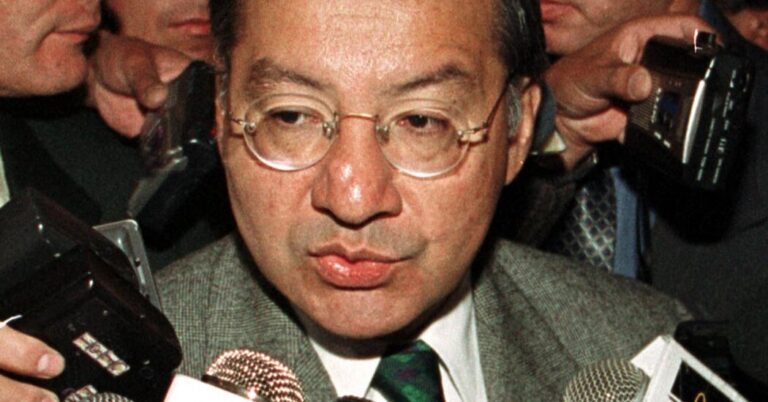A former U.S. ambassador accused of working for decades as a covert agent for Cuba in one of the largest national security breaches in years pleaded guilty Friday and was sentenced to 15 years in prison.
Manuel Rocha, 73, pleaded guilty to two counts – conspiracy to defraud the United States as a foreign agent and failure to register as a foreign agent – in connection with a agreement with the federal government. He also faces three years of supervised release and a $500,000 fine.
Mr. Rocha, dressed in a beige prison uniform and dark glasses, confessed before being sentenced to “betrayal of my oath of loyalty to the United States during my two decades at the State Department.”
“During my formative years at the university, I was strongly influenced by the radical politics of the time,” said Mr. Rocha, who prosecutors say was recruited by Cuban secret service agents in 1973. “Today, I no longer see the world through the radical eyes of my youth.
In imposing the sentence, Judge Beth Bloom of the federal district court in Miami said that as recently as 2022 and 2023, Mr. Rocha was recorded by an undercover FBI agent, demonstrating “a lack of allegiance to UNITED STATES “.
“You have turned your back on the country,” she said. “A country that gave you everything. »
The debates did not shed much light on Mr. Rocha’s relationship with the Cuban government or whether he shared any secrets during his diplomatic career, which included serving as ambassador to Bolivia. and briefly worked in the White House under President Bill Clinton.
In an unusual turn of events, Judge Bloom expressed deep frustration with prosecutors who did not seek more sanctions against Mr. Rocha, such as forfeiture of his property. She demanded changes to the plea agreement in court and pressed prosecutors to reveal more about when the government learned that Mr. Rocha had become “an enemy of the United States government.”
Prosecutors said details other than those made public in the indictment were classified.
“This case reminds us that we face espionage and insider threats from a range of adversaries,” David Newman, principal assistant attorney general for national security at the Justice Department, said in a statement. of a press conference in Miami, where the headquarters of the Department of Justice is located. the largest population of Cuban exiles — after Mr. Rocha’s conviction.
Mr. Rocha was accused in December, as an agent of a foreign government; he was also charged with defrauding the United States, wire fraud, and making false statements to obtain and use a U.S. passport.
Prosecutors dropped the other charges as part of his plea deal; the wire fraud charge carried a maximum sentence of 20 years. Mr. Rocha last appeared in court in February, when he noted that he would change his previous plea of not guilty.
Mr. Rocha’s plea deal required him to share with the government “a full and detailed assessment of the harm that was committed,” Jonathan Douglas Stratton, one of the prosecutors, said in court.
“Fifteen years in prison for a 73-and-a-half-year-old individual is equivalent to a life sentence,” Mr. Stratton said, adding that “it was extremely valuable that the defendant not only pleaded guilty and admitted his conduct criminal, but that it continues to cooperate with the United States.
Before accepting the deal, Judge Bloom asked prosecutors to include language clarifying that Mr. Rocha remained responsible for restitution if victims of his actions emerged.
“I cannot accept that the victim is only the United States,” Judge Bloom said.
The judge also insisted that the agreement make clear that the agreement did not prevent the government from pursuing the civil denaturalization of Mr. Rocha, who was born in Colombia and became a naturalized American citizen in 1978.
As Mr. Rocha spoke in court, his wife, children and other family members watched from the second row.
“I am making and will continue to make, as necessary, significant reparations throughout my unconditional collaboration with those I betrayed,” Mr. Rocha said.
Two former U.S. officials convicted of spying for Cuba in high-profile cases also agreed to provide information to federal authorities as part of their plea deal.
The cooperation of Ana Belén Montes, former analyst of the Defense Intelligence Agency, following his arrest in 2001, led to the indictment of Marta Rita Velazquez, who worked at the U.S. Agency for International Development. Ms. Velazquez fled to Sweden after Ms. Montes’ arrest; an indictment against Ms. Velazquez was unsealed in 2013, but she remains a fugitive.
Ms. Montes was released last year.
In another major case, Walter Kendall Myers, a former State Department official, pleaded guilty in 2009 to spying for Cuba for decades. He is serving a life sentence. His wife, Gwendolyn Steingraber Myers, was also accused and sentenced to almost seven years in prison.
The indictment against Mr. Rocha says he aided the Cuban government, whose intelligence services have had notable success in infiltrating U.S. national security institutions over the decades since at least 1981. He was assigned to the American mission in Havana in the 1990s.
The indictment does not detail Mr. Rocha’s interactions with the Cuban government or accuse him of sharing specific secrets. Nor did he accuse him of espionage, which Mr. Newman attributed in part to the unusually long time since Mr. Rocha last worked in government and had access to information classified.
Raised in New York, Mr. Rocha work at the State Department under Mr. Clinton and President George W. Bush on issues related to Latin America. He was ambassador to Bolivia from 2000 to 2002 and advisor to the US military command that includes Cuba from 2006 to 2012.
After leaving government, he moved to Miami. Former colleagues said they watched with astonishment when Mr. Rocha became a supporter of former President Donald J. Trump — an adoption of conservative politics that the indictment says may have been part of an effort to cover his tracks.


